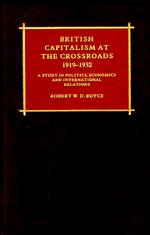 British Capitalism at the Crossroads, 1919–1932
British Capitalism at the Crossroads, 1919–1932 Book contents
- Frontmatter
- Contents
- Preface
- List of abbreviations
- Introduction
- 1 THE POLITICS OF ECONOMIC INTERNATIONALISM
- 2 CRUCIFIED ON A CROSS OF GOLD
- 3 ‘NORMALCY’
- 4 CONFLICT OVER COMMERCE
- 5 THE SCRAMBLE FOR GOLD
- 6 THE SECOND LABOUR GOVERNMENT AT THE HAGUE
- 7 FREE TRADE: THE LAST OFFENSIVE
- 8 THE CHALLENGE OF REGIONALISM
- 9 THE GOLD STANDARD UNDERMINED
- 10 THE AUSTRO-GERMAN CUSTOMS UNION CRISIS
- 11 THE COLLAPSE OF ECONOMIC INTERNATIONALISM
- Conclusion
- Notes
- Bibliography
- Index
4 - CONFLICT OVER COMMERCE
Published online by Cambridge University Press: 05 November 2011
- Frontmatter
- Contents
- Preface
- List of abbreviations
- Introduction
- 1 THE POLITICS OF ECONOMIC INTERNATIONALISM
- 2 CRUCIFIED ON A CROSS OF GOLD
- 3 ‘NORMALCY’
- 4 CONFLICT OVER COMMERCE
- 5 THE SCRAMBLE FOR GOLD
- 6 THE SECOND LABOUR GOVERNMENT AT THE HAGUE
- 7 FREE TRADE: THE LAST OFFENSIVE
- 8 THE CHALLENGE OF REGIONALISM
- 9 THE GOLD STANDARD UNDERMINED
- 10 THE AUSTRO-GERMAN CUSTOMS UNION CRISIS
- 11 THE COLLAPSE OF ECONOMIC INTERNATIONALISM
- Conclusion
- Notes
- Bibliography
- Index
Summary
Global imperatives of the mass production age
Throughout the nineteenth century the vast economic potential of the United States was the subject of periodic fascination in Britain. The First World War briefly demonstrated the reality of this power, when for four and a half years Britain's very existence hinged upon access to American financial and physical resources. Subsequently, the retreat of the United States into political isolation from Europe and the severe postwar slump diverted British attention towards developments closer to home. But by 1925, with British trade still depressed and American recovery in full swing, interest revived and Britons in large numbers journeyed across the Atlantic to see the New World for themselves.
Among those who made the journey there were inevitably some who sought the merely sensational features of American society: the high life of Manhattan, the low life of Chicago, and the phenomenon of Hollywood now in its first era as the film-making capital of the world. But for those seriously concerned to understand the reasons for the remarkable prosperity of the United States the ultimate destination was invariably Detroit, to visit the Ford Motor Company's vast new River Rouge plant. In the case of Captain Victor Cazalet, a junior Minister at the Board of Trade, who gained a personal interview with Henry Ford, the resulting insight was touchingly naive. ‘We began by discussing the Ford system,’ Cazalet recorded.
- Type
- Chapter
- Information
- British Capitalism at the Crossroads, 1919–1932A Study in Politics, Economics, and International Relations, pp. 101 - 133Publisher: Cambridge University PressPrint publication year: 1988


